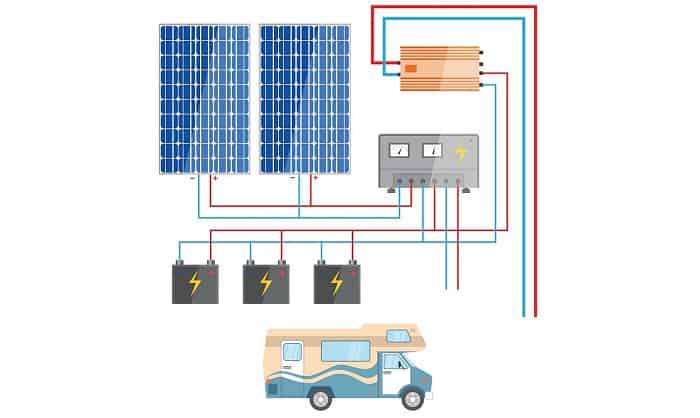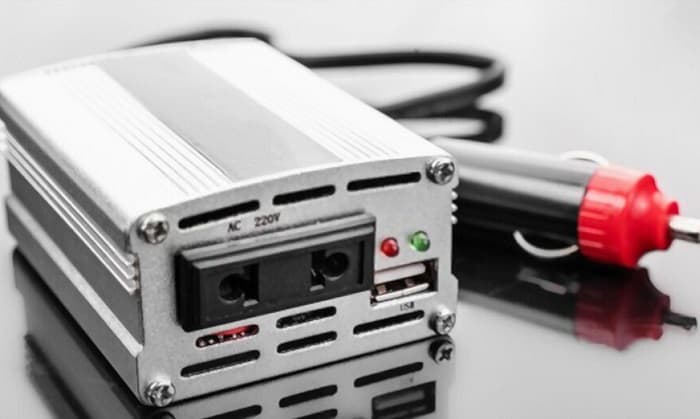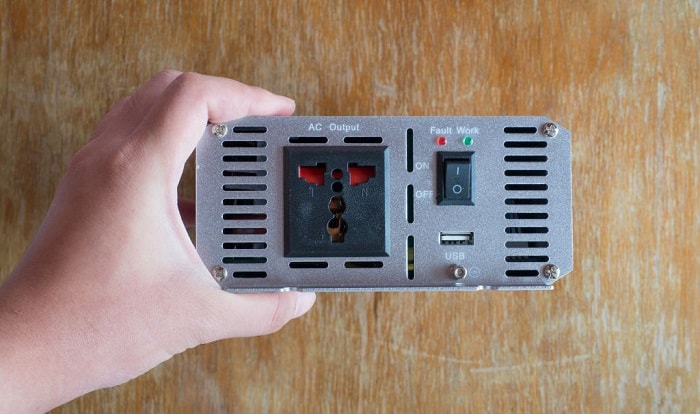Traveling around the world with your RV is so much fun. But to enjoy the comforts and convenience of RVing, your rig requires power. The electrical system of your camper is an essential aspect of your lifestyle, and learning about the AC and DC is the key to understanding an RV inverter.
But what does an inverter do in an RV, and how relevant is it to the full functionality of your rig? Let’s go and find out through this post.
Table of Contents
What Does an RV Inverter Do?
The inverter in RV is most commonly known as a power inverter. It is responsible for the running of the electric current in your rig. This electronic module is essential, especially when you plan to go off-grid without power hookups.
The RV inverters will conver DC electricity to AC power, thus acting as a battery charger. With its functionality, your RV can power AC devices without relying on shore power.
To make things easier to understand, let us learn some basic terms in an electrical system.
- DC is an electrical current that comes from a solar panel installed on the camper or from a battery. The power flow is in one direction only, and it flows at 12 Volts. The DC current is designed to power up small electric needs such as RV lights, vent fans, water pump, and detectors.
- AC indicates the alternating current flows in different directions at 120 Volts. AC is the power that runs on large appliances such as an RV fridge, air conditioner, television, and other appliances requiring higher voltage of power.
- Converter is often mistaken as the same as an inverter, the converter functions in an opposite manner. It converts the AC power into DC power, which is the exact opposite of an inverter.
- Inverter generator uses the same technology as the inverter, but the inverter generator is not an RV inverter. The generator is powered by propane or gas to produce AC power.
Benefits of Using an RV Inverter
Indeed, there are valuable advantages to using an RV inverter, and you will always be on the winning side. So get cracking and hop on. Let’s check why an inverter is an absolute must in your rig.
Benefit #1: Run Appliances Without Shore Power
While traveling, you will have no access to shore power, especially if you will not park on an RV campground.
The good news, with the use of an inverter, you can harness the power of your solar system or batteries and turn them into AC power. And so, even without shore power, you can still run your large appliances even if you’re unplugged from the world.
Thanks to an RV inverter, your RV can power lights, water pumps, and vents. Also, you can relish the comforts of air conditioning, microwave, and stove use, watch TV, play online games, and use your computer.
Benefit #2: No Annoying Noise
Many RVers opt for a generator to power up their rig, but they don’t have a choice except to tolerate its noise. However, with an inverter for your camper, there is no reason to use a loud generator anymore. The inverter can run your appliances without the need for a generator. And so it is indeed super beneficial for your utter comfort.
Benefit #3: Works well with solar panels
If you have solar panels on your camper, using an inverter is a great idea. A solar system produces DC power that is then stored on your batteries. But if you want to know does RV inverter charge battery, then the answer is no. The inverter will convert the DC power from the batteries into AC power so your rig can run all the appliances inside.
Benefit #4: “Standby Mode”
It’s not all the time that you are off the grid. The inverter can go to a “Standby Mode” when you have access to shore power. And so, when you are using shore power to run your large appliances, the inverter stops getting power from the batteries, which allows you to conserve power for later use.
However, the automatic “Standby Mode” is mostly a feature of sophisticated inverters. But of course, you can always manually do this process if your inverter is an older model.
Two Kinds Of RV Inverters
Each type of inverter work in an RV in practically the same manner, but the two kinds of RV inverters vary in waveform outputs.
- Pure Sine Wave – A pure sine wave RV inverter is designed to have similar functionality to a conventional AC electrical system in residences.
- This entails that this kind of inverter is safer to use. It can safely power up all appliances in the RV that are also present in any traditional home. However, the pure sine wave inverter is larger and more expensive than the other inverter types.
- Modified Sine Wave – This type of inverter generates an AC waveform. However, it does not conform to the typical pattern of a power grid. The modified sine wave inverter appears to have a stepped or square waveform.
This kind of inverter is the most used product in the RV world, mostly thanks to its affordable price. However, the modified sine wave is less efficient compared to the pure sine wave inverter.
Guide in Choosing the Best RV Inverter
An inverter for camper is certainly on top of your buying list as you never know where you can spend the night.
- Type – Opt for the pure sine wave if you prefer durability and efficiency. But if you want an affordable but less efficient version, then the modified sine wave is the right one for you.
- Power requirements – Size matters when it comes to an RV inverter. If you need more power, opt for an inverter that can handle 3000 Watts or more. But if your power needs are small, then a 1000 Watts capacity inverter will do.
- Features – All inverters work the same way, but not all products have the same features. Look for an inverter that is packed with numerous features that are essential for your comfort and convenience.
For example, it would be best to buy an RV inverter with a Power Assist feature. This functionality ensures that your appliances will continue to have power even if the shore power is insufficient.
It works by providing power from the DC system when the shore power is weak. So you never have to experience a sudden loss of power in your appliances.
Conclusion
An RV inverter is unquestionably an essential item for your rig that you cannot do without. It allows you to convert a DC power into an AC one to run all your RV appliances.
And now that you know ‘what does an inverter do in an RV?’, kindly share this post so others will learn as well. And please feel free to let us know what you think.

Hi, I am Joseph. Carpe diem! Seize the day! That’s always been my life motto. If you haven’t seen some of the most beautiful places in the country, you are missing out on incredible adventures.




